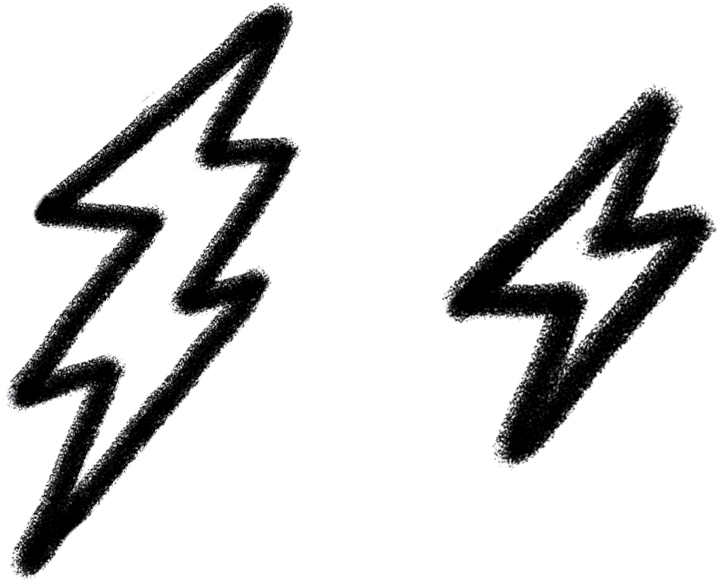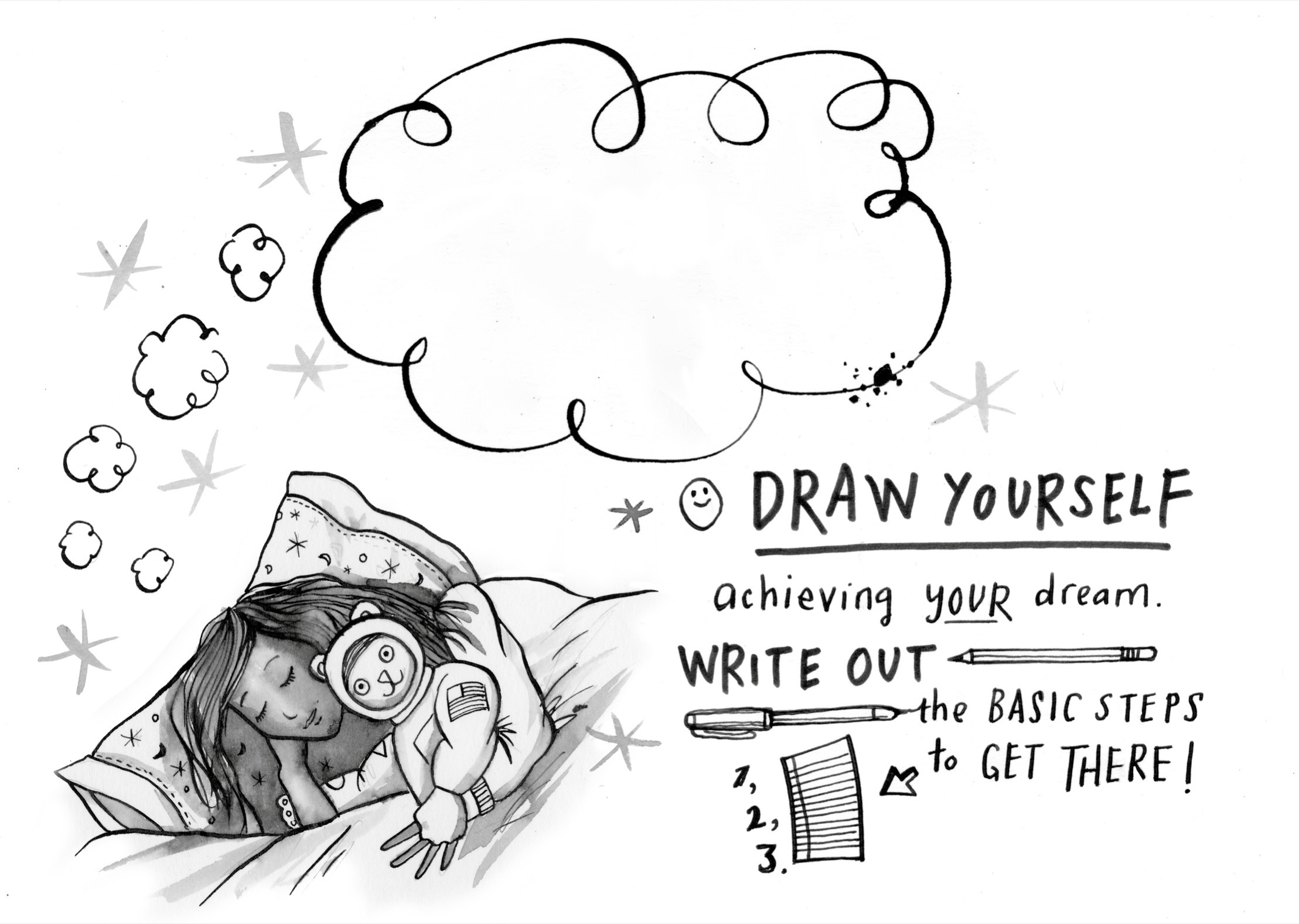 CHAPTER 1
CHAPTER 1 
Turning Dreams into Actions
Nothing is impossible. The word itself says “I’m possible!”
—Audrey Hepburn, actress and humanitarian

One of my earliest memories is of looking up at the night sky and dreaming about the stars. I must have been about four or five years old, and I remember wondering how many of them there were. I wondered what else was out there. But most of all I wondered whether I might someday travel among them.
I’ve known for as long as I can remember that I wanted to become an astronaut. That was my dream: to head toward the stars, walk in space, and see those glowing balls of gas and plasma unfiltered by our planet’s atmosphere. And while that dream never changed, as I got older, it became more sophisticated, more nuanced, and more concrete. I began to think more critically about how I could go about making this dream of walking in space a reality. I knew that it wouldn’t just happen on its own, that no one was going to hand it to me on a silver platter. And so I dug in.
As I did, I learned that turning a dream into reality is, above all, a matter of making a plan, setting goals, and taking action toward those goals. I’ve spent nearly two decades now developing and chasing my own astronomical dream, and a decade sharing that dream with the entire world. During that time I’ve met people who have achieved all kinds of massive dreams; those people include actors, lawyers, newscasters, politicians, researchers, and, of course, my personal favorite, astronauts. I’ve also met countless people, of all ages, who are working toward their dreams. I’ve spoken at conferences and in classrooms about goal setting and dream chasing, received letters and correspondences from people searching for their purpose, and interacted on social media with people at every stage of the dreaming process. What I’ve learned from my own journey, as well as from all of these other journeys that I have crossed paths with, is that the road toward accomplishing a goal is rarely straightforward or smooth. But even as we acknowledge that, we can also find ways to make our paths simpler to follow and our dreams easier to achieve.

What do those ways look like? you might be wondering. Well, there are a few steps, but the very first thing to do is to figure out what it is you’re truly passionate about—this is key, because only once you’ve pinpointed your passions can you start to shape them into a dream. Then you can determine how to make those passions more defined, how to craft them into a specific goal. Once you’ve defined your dream in that way, it’s time to step back, to truly evaluate it, and to decide whether it’s ultimately feasible. At that point, you can go about making your big dream a reality.
Welcome to Dream Big!, your personal guide to all things dreaming and goal setting. In this first chapter we’re going to dive right into what a dream is, how you can find yours, and what the path toward achieving it might look like.

WHAT IS A DREAM?
Dreams matter. Truly, the importance of dreams is something that I’d put on the same level of importance as the fundamental truth that gravity holds us to Earth. That’s a big statement, I know—so let me explain what I mean, starting by defining just what a dream is.
Of course, in the most literal sense, a dream can refer to what plays through our minds when we sleep, or when we allow our thoughts to wander while awake. When that happens, it means we’ve handed control of our thoughts over to our subconscious, and our complex brains create imaginary scenes. These types of dreams can be good (one of my personal favorites is eating ice cream in bed while watching my favorite TV show), bad (like the nightmare I know we’ve all had of showing up late to class, taking a test in a language you don’t understand, and then realizing you’re not wearing any pants), or somewhere in between (like the one I had of riding a giraffe through a city of clouds while harmonizing show ballads).
In this book, though, we’ll talk about dreams a bit differently. Here, a dream is a cherished goal, a dearly held ambition, an aspiration for our future that we strive toward and hope for. And much like the force of gravity to which I’ve just compared the weight dreams can carry, dreams are an unchangeable, constant force. Unlike gravity, however, dreams don’t follow any sort of law of physics; instead, they are part of what I like to think of as the laws of humanity. Having dreams is what makes us human. Dreaming allows us to look past ourselves, to look past our current situation and reality, and to see what can be. Dreams are human creativity and hope taking shape.
When thinking about dreams, I often separate them into two categories: general and personal. People can have both general and personal dreams, but the ways in which they engage with those two types of dreams might vary. Let me explain.
General dreams are those with outcomes that we might hope for, but that we do not hope to personally accomplish. For example, some general dreams might include the dream of peace on Earth or faster-than-light travel, or even the dream that the Vikings might someday win the Super Bowl. Personal dreams are, as you might have guessed from the name, dreams that include a more personal connection, apply to us as individuals in some way, and are tangibly achievable through our own actions. These types of dreams might include becoming a leader at the United Nations and working to minimize conflict around the world; becoming an astrophysicist to research the speed of light and develop faster-than-light travel; or becoming a football player, joining the Vikings, and leading the team to Super Bowl glory. Despite how different all of these personal dreams are, the unifying factor in each of them is that they are focused on future events that the dreamer might someday achieve through the right combination of hard work, natural talent, and luck.

It’s important to keep the distinction between general and personal dreams in mind as you move along your dreaming path. Forgetting this can pose a danger, because general and personal dreams can sometimes be very closely related to one another—or at least seem that way, especially when a personal dream stems from a general dream. It can also be easy to think of the two of them as being connected, because that can help make your own personal dream become more concrete in your mind.
But without going from the general to the personal, you’ll find yourself facing a roadblock on the path toward achieving your dream, because the general dream might just seem too large. However, starting with the general dream can help you narrow down your vision of what you want your personal dream to be. Once you’ve done that, you can start to make plans and take actions in your life to accomplish your personal dream.
I’ll give you an example of what I mean. Let’s say that, like me, you hope that someday humans will walk on Mars—that’s a general dream. But if you take that hope for the future and start to imagine, also like me, that someday you, personally, will set foot on the Red Planet—that begins to make it a personal dream. One broad general dream can allow for any number of specific personal dreams: hoping generally that humans will walk on Mars might also lead you to imagine that you will one day be a flight surgeon, or an electrical engineer, or any of the other hundreds of specialties that are involved in the space program and that will make human travel to Mars a real possibility in the future.
GENERAL DREAMS
Have humans walk on Mars.
PERSONAL DREAMS
Become a mechanical engineer for the space program to help build the rockets to send humans to Mars.
As we discuss dreams in this book, we’ll be looking at personal dreams and talking about how to work to achieve them. But before we can do any of that, we need to take a step back and figure out one very important thing: how to discover, identify, and formulate your dreams.

FINDING YOUR DREAM(S)

I’m lucky enough to have known what my passion is, and to some extent what my dream is, my entire life. If, when I was born, I could have spoken, I probably would have been shouting, “Space. Send me to spaaaace!” But since I wasn’t a miracle baby, I had to wait a few more years before I could vocalize what it was that I intended to do with my future. Of course, it’s also possible that I acquired the desire for space travel at some point after birth, but before my brain was very good at forming and storing long-term memories. Either way, I don’t remember a point at which I came upon my passion for space and my dream to become an astronaut. It was merely something I grew up knowing I aspired to, something that, every time I thought about it, filled me with excitement. When I was too young to read, I would stare up at the night sky and dream of someday flying among the stars, and once I was old enough to read, I remember voraciously consuming all the space books I could get my hands on.
Space, and Mars in particular, was an all-consuming passion for me. Wanting to become an astronaut was a part of my identity. When I was sitting in my first-grade classroom and the teacher asked us to say one thing about ourselves as an introduction, mine was, “My name is Abby and I want to become an astronaut!” As sure as I could proclaim my name, raise enough fingers to show how old I was, or rattle off my home address, I could say what my future goals were. Likewise, when I went to college later on, I introduced myself to people there by handing over a business card listing my website, AstronautAbby.com.
But while my desire to become an astronaut has been tied to my identity for as long as I can remember, I know that for most people, this isn’t usually the case. In fact, most people have to do a bit (or maybe a lot!) of digging before they can unearth their dreams.
And here’s the scoop about starting that digging: since a dream is a future goal that you aspire to achieve because it pertains to something you are passionate about, the first step in finding your dream (or dreams) is to discover what your passions are. And trust me, that alone is no small task!

PASSION: WHAT’S THAT?
Passion is a strong feeling for something that you care about, a feeling that goes beyond a simple interest, that indicates the next level up. I like to think of the distinction between a regular, run-of-the-mill hobby and a more definite passion as a sort of equation: a passion is an interest you have + an extreme focus on that interest + activities related to that interest that you love to do + a deeper meaning that you ascribe to that interest.
It won’t come as a surprise to you to hear that my passion is space. Space is something that I find really interesting, nearly to a level of obsession. I (almost) never get tired of reading about, talking about, or even just thinking about space. The deeper meaning that I ascribe to this interest—and what I believe helps turn it from just an interest into a true passion—is that I believe that space exploration holds the keys to our universe and will be integral to the future of humanity.
Just for the record: you can have more than one passion, and your passions can come in different levels of seriousness! I am very serious about my passion for space—serious enough that I want to dedicate my entire life to it, and am willing to risk everything to explore it. But I also have other passions. I have a passion for dancing ballet, a passion for playing fiddle, a passion for designing my own clothes, and many more. Each of these are activities that I am highly interested in, love to do, and find some deeper meaning in.

One quick—but important—note here: having a passion for something doesn’t mean that acting on it won’t be difficult. It doesn’t mean that you won’t have to work for it. There’s a saying that goes, “Choose a job you love, and you will never have to work a day in your life,” and let me tell you, I can’t stand that saying. It’s just plain not true. Loving your work, or being passionate about what you do, does not mean that you won’t have to put any effort into it, that you’ll enjoy every single moment of it, or that your journey will be easy and straightforward all the time. But having a passion means that you love something enough—and find enough meaning in it—to invest your time and energy to pursue it and, especially, to persevere if the going gets tough. With that said, we get to the obvious question: How do you figure out what your passion is, what makes all the hard work worth it?

FINDING YOUR PASSION(S)
Finding your passion may seem like a daunting task, but I promise it doesn’t have to be difficult! The first step is simply to ask yourself, What is it that I want? This might seem like a rather obvious place to start, but let me break it down a bit further.

First off, remember that when you’re asking yourself this question, you probably don’t want to answer it by thinking about what you want right this instant. That is undoubtedly a useful question, and it’s one that might even be able to help direct you toward your passion. But it could (and likely will) also elicit answers such as, “Huh, I’d really like some ice cream,” or “Man, right now I want to go play basketball.” Neither of those answers is bad, of course, but they likely won’t lead you to figure out a long-term passion for yourself. If you answered that you’d like some ice cream, it’s certainly possible that you truly are passionate about ice cream. Perhaps you dream of inventing a new flavor or of running an ice cream shop. Similarly, if you answered that you’d like to play basketball, you could really have a passion for basketball. Your future might lie in the NBA or in designing sportswear specific to basketball. But it’s more likely that you answered that you want ice cream because you were hungry at the time of the question and perhaps saw someone eating ice cream earlier in the day, or that you answered that you want to play basketball because you heard a basketball being dribbled outside or glanced at the basketball jersey hanging in your room. Ultimately, while the question of What is it that I want right now? is not to be discounted, it usually isn’t the definitive be-all and end-all for defining a dream.
To properly consider the question of what we want, in order to really figure out what our passions are, it’s important to consider not only what we want in the moment but also what we want for the future. I recommend that you not only ask yourself What is it that I want? but that you also ask a series of questions with future times attached, such as:
-
What is it that I want tomorrow?
-
What is it that I want for one week from now? One month from now? One year from now?
-
What is it that I want in five, ten, or even twenty years from now?
Asking yourself these types of questions can help you focus in on what’s really important to you—what you’re passionate about—and provide some context for why you want these things, and they can help lead you to thinking about what your actual dreams could be. Thinking objectively about what it is we want for ourselves at different points in the future can help us to be more focused and accurate in homing in on a passion and a dream.
Try to answer these questions as truthfully as you can, without pressuring or judging yourself. Don’t worry at this point about whether your passions and dreams seem realistic or completely out there. Our world is constantly changing, and something that might seem completely fanciful right now could become a real thing in the near future. Likewise, don’t concern yourself too much with the size or magnitude of your passions and dreams right now. It’s A-okay if your passion is for volleyball and your dream is to make it onto your school’s team next year. It’s also A-okay if your passion leads you to a dream that is as seemingly out of this world as mine might sound. A dream that challenges you in any way is a great dream to have, so if your passions lead you toward a dream that feels monumental or even scares you a little bit to think about, don’t worry—that actually means you’re on the right path!
Let’s pause here for a moment, because I know this isn’t as easy as snapping your fingers and coming up with answers to the questions I’m posing. So let’s say that you’ve gone ahead and asked yourself what it is that you want—now or for the future—and you find that you’re just not sure. You’re not sure what you want now, or in twenty years, or anywhere in between. Don’t worry! We’re not done with the “finding your passion” strategies yet! Here are a few more questions you can ask yourself that might help you figure out what it is that you’re passionate about:
-
Why do I do the things I do right now? To help give yourself some context, write out a list of the things you’ve done today, or in the past week, or over the last weekend. Take a close look at your list and ask yourself, Why did I do each of these things? Are there any points on the list that you did because you just wanted to?
-
What scares me? Think about your answer to this question, and then think about why it scares you. Is there something that comes to mind that makes you just shudder and think, “I could never do that!” If so, ask yourself why that thing scares you so much—and then ask yourself whether maybe, just maybe, you might be able to do the thing after all. (I’ll let you in on a little secret: even though I knew I wanted to be an astronaut, which would mean flying as high as humanly possible, I was scared of heights for a long time when I was growing up!)
-
What makes me happy? Make a list of your hobbies, and then next to each one write out what it is about that activity that makes you happy, what makes you want to keep doing it. Maybe even rate them on a scale of one to ten based on which ones you like the most.
-
Who do I admire? Make a list of people you admire and then think about why you admire them. Would you want to do what they do?
-
What do I want to do when I grow up? Make a list of ten dream jobs. Once you’ve done that, look at them as a group and consider: Are there any similarities among them?
I hope those questions helped spark something in your mind as you work on figuring out what it is that you’re passionate about. But even if none of those questions evoked a strong feeling in you (which is to say, even if you still haven’t found your “thing” yet), do not fear! Self-evaluation and self-assessment are not the only paths forward when discovering a passion. It’s entirely possible that you haven’t encountered your passion yet, which would make it impossible for you to know what it is or how to describe it. The only way to find your passion, if you haven’t yet encountered it, is to try new things. Lots of them. Seriously . . . LOTS!
Branching out gives you your best chance to come across something you’re passionate about, because to find your passion, you have to be engaged with the world around you. But no doubt about it, trying new things can be really hard! In order to try something new (or many somethings new!) you have to be ready to seek out opportunities, be open to new experiences, and be prepared to be bad at something. That’s a really hard thing—to be bad at something. And it’s even harder to try many things and possibly be bad at them! But the only way to find things that you’re passionate about—to find your dreams—is to try new things, especially things that are different from what you’re familiar with or have done before. If you want to find your passions and define your dreams, you have to create a shift within your mind so that you no longer fear failure. You have to give yourself the permission and the freedom to be bad at things without judging yourself too harshly or basing your self-worth on your achievement rate. And when you finally do hit on the right fit for you, even if you’re bad to begin with, chances are you’ll get better with time!
If you’re still not sure what it is that you want to do or what your dream is, just be patient! I know that can be difficult advice to follow, but truly, the way to find your passion, and subsequently define your dream, is to try new things and continuously evaluate your experiences. Try lots of new things and ask yourself questions like, Do I enjoy this? Why or why not? or, Could I see myself doing this in the future, whether in one or five or even ten years? or, Does this thing or activity hold a deeper meaning or connection for me, something that makes it more personally worthwhile than the other things I enjoy? If you keep doing that, eventually you will find something that you are passionate about. Sometimes it just takes time. Be patient and kind with yourself, and sooner or later, you’ll have no problem finding your passions and your dreams.

TALENT ≠ PASSION
I know I’ve already talked about the idea of being bad at something when you first start. I want to come back to that point for a moment, though, because it’s important to prepare yourself and give yourself permission to be bad at something for a while. Maybe even forever. Because the truth of the matter is that passion is not the same thing as talent, and talent is not the same thing as passion. Passion ≠ talent. I bring up this notion again because it is so incredibly important to understand the difference and not equate the two.
Talent is something that you are born with. Talent isn’t something that you get to choose, nor is it something that you can achieve through hard work. A talent might be a great singing voice, or the ability to remember long lists of numbers without practicing, or being able to jump higher, run faster, and go for longer than others. A talent exists before you even try something and shows up before you practice much at all.
But just because you’re good at something doesn’t mean you’ll love it, or even like it. And being talented at something doesn’t necessarily make it your passion. It can be easy to mistake talent for passion because we, as humans, like to achieve things, and so we’ll often do what we’re good at, even if we’re not truly enjoying ourselves. On the flip side, yet equally important: being bad at something (or even just so-so at it) doesn’t mean that it’s not your passion. Having a particular talent should not define what your passion is or what your dreams can be.

FORMING A DREAM OUT OF YOUR PASSION (FINALLY!)
Now that you’ve spent some time coming up with your passions, you can (finally!) start to make use of those passions and search for your dreams. Just like there was an equation for what makes up a passion (a hearty dose of interest, a strong splash of enjoyment, and a hefty sprinkle of deeper meaning and connection), dreams also have an equation, and it’s a bit simpler than the one for passions—there are only two components! In short, dreams are: your passion + a goal. The good news here is that you’ve already done the hard work, which is discovering what you’re passionate about. Now all you have to do is search within that passion for something that you hope to accomplish! For me, it was transitioning my passion for space into a desire to go to space, and then coming up with the more specific dream of being the first astronaut to walk on Mars. Not all dreams that you form have to be lifelong aspirations like this—but they can be. The beautiful thing about a dream is that, as long as it’s fueled by a passion, the rest of the details (the magnitude of the dream, the time it’ll take to accomplish, and so on) don’t really matter.
Your dream might be as large in magnitude as a lifelong career, or as small as a single action. It might be about attaining something that’s forty years down the road, or it could entail reaching for something that’s just a couple weeks, or even days, away. Dreams aren’t defined by the time it takes to reach them, or the relative effort. Dreams are defined by what fuels you to chase after them—a dream is something you go after because you are passionate about it.
WHAT DO YOU DREAM ABOUT?
WHAT ARE YOU PASSIONATE ABOUT?
Which of these passions and dreams line up?

FINDING FEASIBILITY IN YOUR BIG DREAM
As you’re going through the process of shaping your passion into a dream, one thing to consider is the feasibility of the goal you’ve set for yourself as part of your new dream. I don’t at all say this to scare you off from chasing big dreams or to tamp down your excitement in any way. In fact, I raise it because being honest with yourself will make your dreams stronger, will help you home in on a dream that’s authentic to you, and will help you handle anyone who doesn’t believe in your dream.

The truth of the matter is that you can’t really defend something unless you’ve considered it from all angles—and that goes for your dreams as well. It’s absolutely vital to ask the hard questions about any dream that you are forming or chasing—questions like, “What are my odds?” or, “What will I lose or gain by striving toward this, and am I willing to take that risk?” Addressing these questions improves your ability to pursue your dreams and makes it harder for the haters to hate as you go.
While engaging in this kind of personal assessment, you might find that your passion—or maybe just one of your passions—is something you’re just really not very good at, not at the beginning, not after a couple months, or maybe not even after years of practice. And this is okay. At the end of the day, some of your passions can remain passions without becoming dreams. In my life, music definitely fits into the category of “passion but not dream.” As much as I love music—and even tried my hand at learning to play the violin—it’s just not something I’m especially good at (and that’s putting it lightly). So while I know that I can wholeheartedly appreciate music in the course of my daily life, I also recognize that I don’t have to attach any concrete goal to it and make it into a full-fledged dream.
All of which is to say: it is important to try new things in order to discover what you are passionate about, but it is equally important to understand not only that talent and passion are different, but also that not all of your passions need to become dreams. An important part of a dream is that it’s realistic, that there is some semblance of possibility in it. That through the right combination of hard work, talent, and good luck, it can be achievable. Creating a dream is all about being honest with yourself while pushing your boundaries.

TAKING ACTION: BIG DREAMS GROW FROM A SERIES OF SMALL ACTIONS
Thinking about accomplishing a dream can be daunting—often the goal you’re trying to reach will feel impossibly far away. It might seem difficult to start taking actions toward your big dream because it seems like, in order to reach a big dream, you’d need to start with a big action. But the truth of it is that big dreams don’t require big actions; they just require a consistent pattern of small actions. Every successful person, every person out there who has accomplished their dream, did so through a long series of small actions—which is lucky, because it’s much easier to start down a path when all it takes is one small step. As we saw with the moon landings, a single small action is often the catalyst for an incredible future.
The first small step that each and every dreamer needs to take if they hope to be successful is to make a plan. To create your plan, start by marking down what your dream is, where you stand right now along the path toward achieving it, and when you hope to ultimately accomplish it. Next, make a list of all the things you will need to do, large or small, in order to make your dream a reality. Add in approximate dates by which to accomplish each item on the list, and then begin to create detailed steps to reach each of these milestones.
I made my first plan for becoming an astronaut when I was eleven years old. I had just had a conversation with my mom in which she asked me questions similar to those we’ve just discussed about how feasible my dream actually was, given that out of 7 billion people on the planet, fewer than six hundred had ever been to outer space. After laying it all out for me and hearing that I was still going full steam ahead for my dream (and maybe even more so than before I had learned just how difficult it would be—I’ve always loved a good challenge), my mom challenged me to create my first written plan of how I would go about accomplishing my dream.

It was this plan that led me to go to Space Camp when I was thirteen, that influenced me to study Mandarin Chinese when I was fourteen (and later Russian as well), that led me to becoming an advanced scuba diver, that guided my choices of where to go to college and what to major in, that allowed me to work in a NASA astrobiology research laboratory at nineteen, that inspired me to become a pilot at twenty-one, and so much more.
I didn’t follow the plan that I wrote out at age eleven to the letter—in fact, there are very few specific parts of it that ended up actually happening in my life. As I continued onward over the next decade, I diverged and then rejoined with my plan, as well as revised and sometimes even scrapped the plan and started a new one, all to deal with the chaotic path that real life presents. The point of making a plan isn’t to create a strict set of rules to live by or to mandate that only by way of this very specific set of actions and circumstances will you achieve your dream. No, the point of making a plan is to take that first action, the first small step toward your dream. Writing out a plan can help you organize what things you think you’ll need to accomplish in order to achieve your dream, and to think about when you’ll need to accomplish them, and how. It breaks up what can otherwise seem like an insurmountable task into smaller steps that are easily achievable, one by one, to eventually lead to your big dream. Most importantly, writing out a plan forces you to engage in self-reflection and assessment, necessary actions to keep you focused on what your goal really is and to go down a path that will allow you to reach your dreams.
Before we move on to the rest of the book, I’d like to make one point perfectly clear, and that is: you can have more than one dream. Dreams come in different shapes and sizes, and sometimes a dream may grow or fade—you don’t have to have the same dream your entire life! You might have some dreams that are specific to certain points in your life or to certain activities, while other dreams might revolve around things you aspire to accomplish unrelated to anything else you’re doing. When I was in high school, I dreamed of becoming the captain of my school’s gymnastics team. I also dreamed of meeting one of my favorite authors (Tamora Pierce) and of writing a book. All of these dreams existed side by side with my overarching dream of someday walking on Mars. I chose to stick with my Mars dream, to try to see it through to the end, and that choice worked for me. But everyone can and should do this differently!

You’ve probably heard the name Audrey Hepburn—she’s widely considered to be one of the greatest movie stars of all time. And that’s not just an opinion—she’s actually one of only fifteen people ever to have received all four major entertainment-industry awards (the Oscar, the Emmy, the Grammy, and the Tony). Throughout her life, Audrey always followed her passions and let them guide her to stardom. Growing up in Nazi-occupied Holland during the height of World War II, she fought back against the injustice she saw by performing in secret ballet recitals to raise money for the resistance effort. She made a difference in the world by following her passions and doing what she loved. Audrey became a Hollywood actress because she spent her entire life following her passions—first for ballet, then for modeling, and finally for acting! Just like Audrey, if you follow your passions in life with unending dedication, you’ll undoubtedly achieve your dreams.
The single most important thing to remember as you go is that dreams are at the heart of humanity, and each and every one of us has a dream, but sometimes finding and recognizing these dreams can be difficult. Dreams are achieved by way of actionable goals that are based in passion, so to find our dreams we have to first discover what it is that we’re passionate about. And now that we’re well on our way, I hope you’ll join me as we dive into figuring out just how to make our dreams a reality!